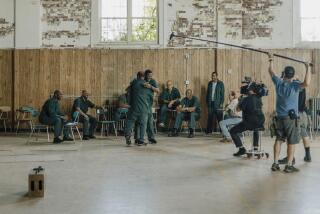Review: Online dating changes a Himalayan monk’s life in the riveting ‘Sing Me a Song’
- Share via
The visually poetic, observational nonfiction film “Sing Me a Song” follows a young Bhutanese monk named Peyangki as he personally experiences digital disruption. Constructed more like a coming-of-age drama than a documentary, it spins a fascinating tale of romantic melancholy played out against the peaceful, meditative backdrop of the Himalayas.
A follow-up to director Thomas Balmès’ 2014 film “Happiness” (available free online from PBS), which chronicled the boy’s initiation into a monastery and his family’s pursuit of its first television set after the arrival of electricity in the remote village of Laya, the highest settlement in Bhutan, “Sing Me a Song” continues the saga with more focused narrative drive than its predecessor.
We first meet Peyangki as the joyful, free-spirited 8-year-old we saw at the end of “Happiness,” running, skipping and singing quietly as he makes a crown of flowers. He confides to the camera that he hopes to become a lama and shares his excitement about one day seeing airplanes and tall buildings. He recounts the apocryphal story of how his father died of a heart attack upon encountering a bear on the day Peyangki was born.
Fast forward 10 years and Peyangki is living in a nearby monastery, awakened each morning by the alarm on his now omnipresent mobile phone, electricity having brought the internet to Laya. Even during their morning prayers, the young monks are as inseparable from their devices as any teens — texting, gaming and watching videos — but Peyangki is particularly besotted.
Peyangki struggles with his studies and worries that he is not intelligent enough to learn, oblivious to practical concerns and the absence of a true spiritual calling. His one solace? Listening to love songs on the WeChat app on his phone. Online, he meets a bar singer named Ugyen who lives in the capital city of Thimphu (a veritable metropolis of more than 100,000 people), and the two embark on a tentative relationship — though neither is entirely forthcoming with the other.
Balmès artfully moves between the two young people, withholding commentary and judgment, as they navigate the onset of adulthood, the limits of their environments and the vastness of the world that rests in the palm of their hands. Even with the low-key nature of the subjects, it is a genuinely riveting story as we wait to see what happens when these worlds collide.
The film works equally well on an ethnographic level. In continuing with Peyangki’s reluctant existence as a monk, Balmès bears intimate witness to someone teetering on the edge of monastic life. It’s a challenging path, but the film also presents a more whimsical side, including an apparent shout-out to Bhutanese filmmaker Khyentse Norbu’s charming 1999 film “The Cup.” Balmès’ juxtaposition of hardscrabble rural existence and urban life where anything can be commodified — even dreams — presents a captivating portal into a less familiar culture.
Ultimately about things greater than the impact of technology, “Sing Me a Song” inevitably leads us back to an assessment of the earlier film’s title: What is “Happiness”? With 2020 in our collective rear-view mirror and the tentative promise of 2021 upon us, you could do worse than kicking off the new year with this brief meditation.
‘Sing Me a Song’
In Dzongkha with English subtitles
Not rated
Running time: 1 hour, 40 minutes
Playing: Available in virtual cinemas, including Laemmle Theatres, and on VOD
More to Read
Only good movies
Get the Indie Focus newsletter, Mark Olsen's weekly guide to the world of cinema.
You may occasionally receive promotional content from the Los Angeles Times.











